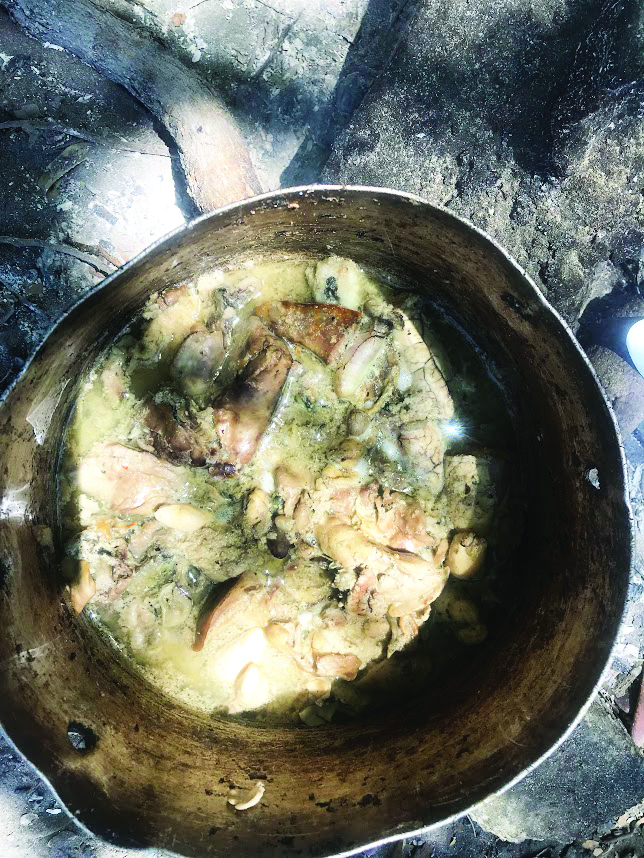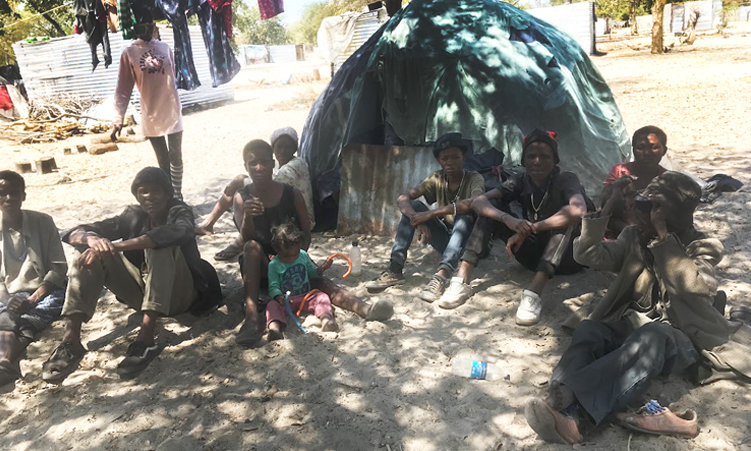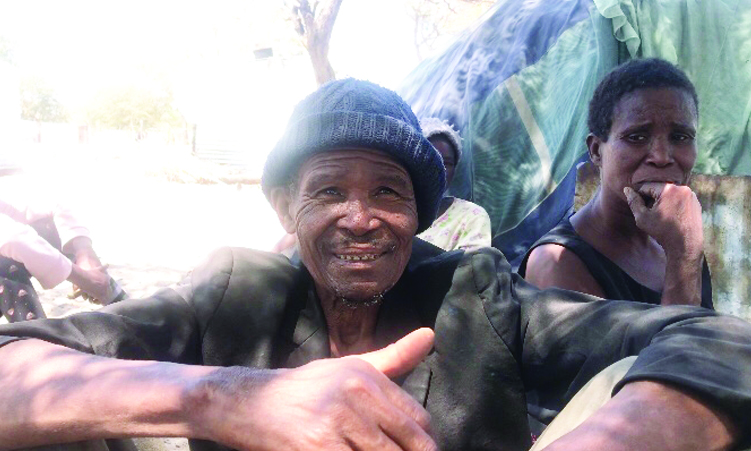Two families of 79 San people at Eenhana in the Ohangwena region say they are surviving on a dumpsite.
Every morning and every afternoon they go to the local dumpsite to look for food.
Ten other families at Opalasha informal settlement at Eenhana survive in the same way.
“This is what we eat every day,” says Nangula Haihambo, a mother of five.
“We did not eat last night. These children you see here did not eat anything last night, but they are not hungry, because they are not used to eating every day,” she says while preparing a meal of fish intestines for lunch.
Her family members found it at the dumpsite, she says.
What remains after lunch will be served for dinner.
Namibia has been hit hard by severe food insecurity, with an estimated 376 000 people experiencing a food crisis, according to a recent World Food Programme (WFP) report.
This represents 14% of the country’s population, with 6 000 of those people at emergency level.

‘OPALASHA’
The Namibian this week visited two families at Opalasha.
Behind their smiles and warm welcomes they battle hunger, thirst, poor sanitation and a lack of proper shelter.
Their rooms are made of discarded plastic bags.
Shamoolimo Kankameni (61) says his family consists of 39 members, including three elderly people, some unemployed young people and five children, ranging from one week to three years old.
The family depends on the elders’ monthly old-age grants for survival, he says.
The majority of family members cannot read or write, and they do not know their ages.
Kankameni says his family does not have beds. They lie on dirty washing on the floors of their tiny rooms.
The rooms are scattered around a big tree, leaving them vulnerable to snake and scorpion bites, he says.
Kankameni says some of the men sleep in an open space under the tree as there is no room for them inside.

WATER PROBLEM
Ndaidililwa Nghilifa (45) says the family does not have access to clean water as there are no communal taps at the settlement.
She says they rely on their neighbours, who have the privilege of water flowing from their taps.
According to Nghilifa, a 20-litre container of water costs N$2,50 – a significant sum in a community where every cent counts.
A two-litre container costs N$1, she says.
“If we don’t have money, we can’t get water. That means you will not cook or bath until you get N$2,50.”
“We have been asking to be provided clean water. The constituency councillor promised they would give us, but they never honoured their promises,” she says.
Nghilifa said although she is sick, she does not get a monthly disability grant.
“I got it for seven months last year, but they stopped it, saying I can work on my own.
“I can’t work on my own. I cannot even carry a container of water,” the mother of three says.
Maria Mafufu says she cannot walk.
She says she hopes to get a social grant soon as she recently obtained an identity document. Mafufu says her family is hungry because they depend on drought-relief food from the government.
“The last time we got food was two months ago. Now the food is finished,” she says.
Julias Lukas (43) says about 40 people live at his homestead.
Here some people sleep in two shacks, while others sleep in rooms crafted with plastic bags.
Lukas says he survives on selling baskets for N$200 each at Eenhana.

SNAKEBITE
Pukulukeni Autava tells The Namibian he was bitten by a snake last month while sleeping in his room, which lacks proper bedding.
“I could have lost my life. The snake bit me on the head. I lost consciousness and was initially treated by a traditional healer before being transported to Eenhana hospital,” he says.
He says the traditional healer used a blade to cut his head open, then pressed down on the wound while sucking his blood to get rid of the poison.
“We want the government to move us from this place and build decent houses for us, like it has done for other San families at Oupili and Onakalunga villages and other places,” Autava says.
He says there has been no food at home for close to two months, so they drink tombo (traditional brew).
“Like now the children are back from school, they do not have anything to eat. This is how we survive,” Autava says.
‘FIGHTING HARD’
A 2021 Namibia multidimensional poverty index report by the Namibia Statistics Agency shows that the Ohangwena region is one of the country’s regions with the highest number of poor people, followed by the Khomas and Omusati regions.
Marginalised communities deputy minister Royal /Ui/o/oo yesterday said he is fighting hard for marginalised communities in the country.
“I believe they must receive food and water, like any other Namibian. They should live well, but as you may be aware, our budget is very tight,” he said.
Eenhana mayor Omri-onn Kavandje says the Eenhana Town Council has donated land to the department of marginalised communities to develop it and house San people.
“If they cannot afford to pay N$2, will they be able to pay their water bill per month if we give them water?” he asks.
He says San families live a nomadic life.
They do not always stay at Opalasha for long as the majority of them are Angolan nationals, he says.
“Sometimes, when you go there they are not there. They move every day. Some are there for visiting purposes, while some have come to the hospital.
“It’s difficult to change their lifestyle. You give them a house, they abandon it, or you give them clean water, then you will find them getting water from a well,” he says.
Eenhana constituency regional councillor Olivia Hanghuwo did not respond to numerous calls and two text messages sent to her yesterday.
*This article is supported by Internews, an international media development organisation that supports independent media in over 100 countries.


